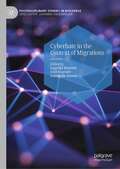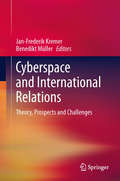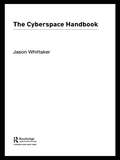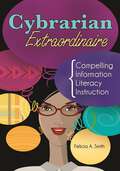- Table View
- List View
Cutting Edge: Students' Book (3rd edition) (PDF)
by Damian Williams Jonathan Bygrave Peter Moor Sarah CunninghamNew World culture lessons encourage the exploration of contemporary topics and develop online research skills. Language live lessons provide motivating contexts for practising functional language and writing. Comprehensive Language summary and Grammar practice sections are included at the back of book as well as a Students' DVD-ROM featuring all the audio and video clips and a digital Mini dictionary of key vocabulary.
Cutting Plays for Performance: A Practical and Accessible Guide
by Toby Malone Aili HuberCutting Plays for Performance offers a practical guide for cutting a wide variety of classical and modern plays. This essential text offers insight into the various reasons for cutting, methods to serve different purposes (time, audience, story), and suggests ways of communicating cuts to a production team. Dealing with every aspect of the editing process, it covers structural issues, such as plot beats, rhetorical concepts, and legal considerations, why and when to cut, how to cut with a particular goal in mind such as time constraints, audience and storytelling, and ways of communicating cuts to a production team. A set of practical worksheets to assist with the planning and execution of cuts, as well as step-by-step examples of the process from beginning to end in particular plays help to round out the full range of skills and techniques that are required when approaching this key theatre-making task. This is the first systematic guide for those who need to cut play texts. Directors, dramaturgs, and teachers at every level from students to seasoned professionals will find this an indispensable tool throughout their careers.
Cutting Plays for Performance: A Practical and Accessible Guide
by Toby Malone Aili HuberCutting Plays for Performance offers a practical guide for cutting a wide variety of classical and modern plays. This essential text offers insight into the various reasons for cutting, methods to serve different purposes (time, audience, story), and suggests ways of communicating cuts to a production team. Dealing with every aspect of the editing process, it covers structural issues, such as plot beats, rhetorical concepts, and legal considerations, why and when to cut, how to cut with a particular goal in mind such as time constraints, audience and storytelling, and ways of communicating cuts to a production team. A set of practical worksheets to assist with the planning and execution of cuts, as well as step-by-step examples of the process from beginning to end in particular plays help to round out the full range of skills and techniques that are required when approaching this key theatre-making task. This is the first systematic guide for those who need to cut play texts. Directors, dramaturgs, and teachers at every level from students to seasoned professionals will find this an indispensable tool throughout their careers.
Cyber Ireland: Text, Image, Culture
by C. LynchCyber Ireland explores, for the first time, the presence and significance of cyberculture in Irish literature. Bringing together such varied themes as Celtic mythology in video games, Joycean hypertexts and virtual reality Irish tourism, the book introduces a new strand of Irish studies for the twenty-first century.
Cyber Shock (PDF)
by Tommy DonbavandMark was holding his knee. His trousers were torn, and I expected to see loads of blood where he'd cut himself - but there was none of that. Mark's skin was ripped back and, inside his knee, there was a long, metal bar and loads of coloured wires.
Cyberfiction: After the Future
by P. YoungquistCyberfiction: After the Future explores a world where cybernetics sets the terms for life and culture - our world of ubiquitous info-tech, instantaneous capital flows, and immanent catastrophe. Economics fuses with technology to create a new kind of speculative fiction: cyberfiction. Paul Youngquist reveals the ways in which J. G. Ballard, Philip K. Dick, Samuel Delany, Octavia Butler, and William Gibson, among others, map a territory where information reigns supreme and the future is becoming a thing of the past.
Cyberformalism: Histories of Linguistic Forms in the Digital Archive
by Daniel ShoreLinguistic forms are essential to meaning: like words, they make a semantic contribution to the things we say. We inherit them from past writers and speakers and fill them with different words to produce novel utterances. They shape us and the ways we interpret the world. Yet prevalent assumptions about language and the constraints of print-finding tools have kept linguistic forms and their histories hidden from view. Drawing on recent work in cognitive and construction grammar along with tools and methods developed by corpus and computational linguists, Daniel Shore;€™s Cyberformalism represents a new way forward for digital humanities scholars seeking to understand the textual past. Championing a qualitative approach to digital archives, Shore uses the abstract pattern-matching capacities of search engines to explore precisely those combinatory aspects of language;¢;‚¬;€?word order, syntax, categorization;¢;‚¬;€?discarded by the "bag of words" quantitative methods that are dominant in the digital humanities. While scholars across the humanities have long explored the histories of words and phrases, Shore argues that increasingly sophisticated search tools coupled with growing full-text digital archives make it newly possible to study the histories of linguistic forms. In so doing, Shore challenges a range of received metanarratives and complicates some of the most basic concepts of literary study. Touching on canonical works by Shakespeare, Milton, Wordsworth, and Kant, even as it takes the full diversity of digitized texts as its purview, Cyberformalism asks scholars of literature, history, and culture to revise nothing less than their understanding of the linguistic sign.
Cyberformalism: Histories of Linguistic Forms in the Digital Archive
by Daniel ShoreLinguistic forms are essential to meaning: like words, they make a semantic contribution to the things we say. We inherit them from past writers and speakers and fill them with different words to produce novel utterances. They shape us and the ways we interpret the world. Yet prevalent assumptions about language and the constraints of print-finding tools have kept linguistic forms and their histories hidden from view. Drawing on recent work in cognitive and construction grammar along with tools and methods developed by corpus and computational linguists, Daniel Shore;€™s Cyberformalism represents a new way forward for digital humanities scholars seeking to understand the textual past. Championing a qualitative approach to digital archives, Shore uses the abstract pattern-matching capacities of search engines to explore precisely those combinatory aspects of language;¢;‚¬;€?word order, syntax, categorization;¢;‚¬;€?discarded by the "bag of words" quantitative methods that are dominant in the digital humanities. While scholars across the humanities have long explored the histories of words and phrases, Shore argues that increasingly sophisticated search tools coupled with growing full-text digital archives make it newly possible to study the histories of linguistic forms. In so doing, Shore challenges a range of received metanarratives and complicates some of the most basic concepts of literary study. Touching on canonical works by Shakespeare, Milton, Wordsworth, and Kant, even as it takes the full diversity of digitized texts as its purview, Cyberformalism asks scholars of literature, history, and culture to revise nothing less than their understanding of the linguistic sign.
Cyberhate in the Context of Migrations (Postdisciplinary Studies in Discourse)
by Angeliki Monnier Axel Boursier Annabelle SeoaneThis edited book takes an interdisciplinary approach to shed light on the complex dynamics involved in the incidence of online hate speech against migrants in user-generated contexts. The authors draw on case studies from Finland, France, Germany, Italy, Poland and the UK, bringing together qualitative and quantitative analyses on user-generated online comments. The authors argue that online hate speech against migrants must be understood as a symptom of a representation crisis on migration, which can only be fully perceived through the study of the complex linguistic, interactional and connective processes within which it emerges. They focus on representations and shared meanings, community building and otherness, and delve into the role of network ecosystems in the process of the construction of public problems. This book will be of interest to undergraduate and post-graduate students as well as academics working on hate speech and migration studies in a variety of fields, and can also contribute to improving research protocols for automated analyses and detections of online hate speech.
Cyberprotest: Environmental activism online
by Jenny PickerillUses case studies and voices of activists themselves to examine the role of the internet at all levels of environmental activism. Contemporary analysis of forms and processes of radical environmental activism. Contemporary analysis of forms and processes of radical environmental activism. Documents the negotiations and achievements of environmentalists both in dealing with the tensions of using environmentally damaging technology and in avoiding surveillance and counter-strategies. Will be of interest to students and academics of politics, sociology, environmental studies and anyone who has ever wondered if signing an email petition will make a difference.
Cyberpunk Culture and Psychology: Seeing through the Mirrorshades (Routledge Research in Cultural and Media Studies)
by Anna McFarlaneThis book traces developments in cyberpunk culture through a close engagement with the novels of the ‘godfather of cyberpunk’, William Gibson. Connecting his relational model of ‘gestalt’ psychology and imagery with that of the posthuman networked identities found in cyberpunk, the author draws out relations with key cultural moments of the last 40 years: postmodernism, posthumanism, 9/11, and the Anthropocene. By identifying cyberpunk ways of seeing with cyberpunk ways of being, the author shows how a visual style is crucial to cyberpunk on a philosophical level, as well as on an aesthetic level. Tracing a trajectory over Gibson’s work that brings him from an emphasis on the visual that elevates the human over posthuman entities to a perspective based on touch, a truly posthuman understanding of humans as networked with their environments, she argues for connections between the visual and the posthuman that have not been explored elsewhere, and that have implications for future work in posthumanism and the arts. Proposing an innovative model of reading through gestalt psychology, this book will be of key importance to scholars and students in the medical humanities, posthumanism, literary and cultural studies, dystopian and utopian studies, and psychology.
Cyberpunk Culture and Psychology: Seeing through the Mirrorshades (Routledge Research in Cultural and Media Studies)
by Anna McFarlaneThis book traces developments in cyberpunk culture through a close engagement with the novels of the ‘godfather of cyberpunk’, William Gibson. Connecting his relational model of ‘gestalt’ psychology and imagery with that of the posthuman networked identities found in cyberpunk, the author draws out relations with key cultural moments of the last 40 years: postmodernism, posthumanism, 9/11, and the Anthropocene. By identifying cyberpunk ways of seeing with cyberpunk ways of being, the author shows how a visual style is crucial to cyberpunk on a philosophical level, as well as on an aesthetic level. Tracing a trajectory over Gibson’s work that brings him from an emphasis on the visual that elevates the human over posthuman entities to a perspective based on touch, a truly posthuman understanding of humans as networked with their environments, she argues for connections between the visual and the posthuman that have not been explored elsewhere, and that have implications for future work in posthumanism and the arts. Proposing an innovative model of reading through gestalt psychology, this book will be of key importance to scholars and students in the medical humanities, posthumanism, literary and cultural studies, dystopian and utopian studies, and psychology.
Cyberpunk & Cyberculture: Science Fiction and the Work of William Gibson
by Dani CavallaroCyberpunk and Cyberculture explores the work of a wide range of writers- Acker, Cadigan, Rucker, Shierley, Sterling, Williams and, of course, Gibson - setting their work in the context of science fiction, other literary genres, genre cinema - from Metropolis to Terminator to The Matrix - and contemporary work on the culture of technology.
Cyberspace and International Relations: Theory, Prospects and Challenges
by Jan-Frederik Kremer Benedikt MüllerCyberspace is everywhere in today’s world and has significant implications not only for global economic activity, but also for international politics and transnational social relations. This compilation addresses for the first time the “cyberization” of international relations - the growing dependence of actors in IR on the infrastructure and instruments of the internet, and the penetration of cyberspace into all fields of their activities. The volume approaches this topical issue in a comprehensive and interdisciplinary fashion, bringing together scholars from disciplines such as IR, security studies, ICT studies and philosophy as well as experts from everyday cyber-practice. In the first part, concepts and theories are presented to shed light on the relationship between cyberspace and international relations, discussing implications for the discipline and presenting fresh and innovative theoretical approaches. Contributions in the second part focus on specific empirical fields of activity (security, economy, diplomacy, cultural activity, transnational communication, critical infrastructure, cyber espionage, social media, and more) and address emerging challenges and prospects for international politics and relations.
The Cyberspace Handbook
by Jason WhittakerThe Cyberspace Handbook is a comprehensive guide to all aspects of new media, information technologies and the internet. It gives an overview of the economic, political, social and cultural contexts of cyberspace, and provides practical advice on using new technologies for research, communication and publication. The Cyberspace Handbook includes: *a glossary of over eighty key terms*a list of over ninety web resources for news and entertainment, new media and web development, education and reference, and internet and web information* specialist chapters on web design and journalism and writing on the web*Over thirty illustrations of internet material and software applications.Jason Whittaker explores how cyberspace has been constructed, how it is used and extends into areas as different as providing us immediate news or immersive games and virtual technologies for areas such as copyright and cybercrime, as well as key skills in employing the internet for research or writing and designing for the Web.
The Cyberspace Handbook
by Jason WhittakerThe Cyberspace Handbook is a comprehensive guide to all aspects of new media, information technologies and the internet. It gives an overview of the economic, political, social and cultural contexts of cyberspace, and provides practical advice on using new technologies for research, communication and publication. The Cyberspace Handbook includes: *a glossary of over eighty key terms*a list of over ninety web resources for news and entertainment, new media and web development, education and reference, and internet and web information* specialist chapters on web design and journalism and writing on the web*Over thirty illustrations of internet material and software applications.Jason Whittaker explores how cyberspace has been constructed, how it is used and extends into areas as different as providing us immediate news or immersive games and virtual technologies for areas such as copyright and cybercrime, as well as key skills in employing the internet for research or writing and designing for the Web.
Cybertext Poetics: The Critical Landscape of New Media Literary Theory (International Texts in Critical Media Aesthetics)
by Markku EskelinenEqually interested in what is and what could be, Cybertext Poetics combines ludology and cybertext theory to solve persistent problems and introduce paradigm changes in the fields of literary theory, narratology, game studies, and digital media. The book first integrates theories of print and digital literature within a more comprehensive theory capable of coming to terms with the ever-widening media varieties of literary expression, and then expands narratology far beyond its current confines resulting in multiple new possibilities for both interactive and non-interactive narratives. By focusing on a cultural mode of expression that is formally, cognitively, affectively, socially, aesthetically, ethically and rhetorically different from narratives and stories, Cybertext Poetics constructs a ludological basis for comparative game studies, shows the importance of game studies to the understanding of digital media, and argues for a plurality of transmedial ecologies.
Cybertext Poetics: The Critical Landscape of New Media Literary Theory (International Texts in Critical Media Aesthetics #2)
by Markku EskelinenEqually interested in what is and what could be, Cybertext Poetics combines ludology and cybertext theory to solve persistent problems and introduce paradigm changes in the fields of literary theory, narratology, game studies, and digital media. The book first integrates theories of print and digital literature within a more comprehensive theory capable of coming to terms with the ever-widening media varieties of literary expression, and then expands narratology far beyond its current confines resulting in multiple new possibilities for both interactive and non-interactive narratives. By focusing on a cultural mode of expression that is formally, cognitively, affectively, socially, aesthetically, ethically and rhetorically different from narratives and stories, Cybertext Poetics constructs a ludological basis for comparative game studies, shows the importance of game studies to the understanding of digital media, and argues for a plurality of transmedial ecologies.
Cyborg Saints: Religion and Posthumanism in Middle Grade and Young Adult Fiction (Children's Literature and Culture)
by Carissa Turner SmithSaints are currently undergoing a resurrection in middle grade and young adult fiction, as recent prominent novels by Socorro Acioli, Julie Berry, Adam Gidwitz, Rachel Hartman, Merrie Haskell, Gene Luen Yang, and others demonstrate. Cyborg Saints: Religion and Posthumanism in Middle Grade and Young Adult Fiction makes the radical claim that these holy medieval figures are actually the new cyborgs in that they dethrone the autonomous subject of humanist modernity. While young people navigate political and personal forces, as well as technologies, that threaten to fragment and thingify them, saints show that agency is still possible outside of the humanist construct of subjectivity. The saints of these neomedievalist novels, through living a life vulnerable to the other, attain a distributed agency that accomplishes miracles through bodies and places and things (relics, icons, pilgrimage sites, and ultimately the hagiographic text and its reader) spread across time. Cyborg Saints analyzes MG and YA fiction through the triple lens of posthumanism, neomedievalism, and postsecularism. Cyborg Saints charts new ground in joining religion and posthumanism to represent the creativity and diversity of young people’s fiction.
Cyborg Saints: Religion and Posthumanism in Middle Grade and Young Adult Fiction (Children's Literature and Culture)
by Carissa Turner SmithSaints are currently undergoing a resurrection in middle grade and young adult fiction, as recent prominent novels by Socorro Acioli, Julie Berry, Adam Gidwitz, Rachel Hartman, Merrie Haskell, Gene Luen Yang, and others demonstrate. Cyborg Saints: Religion and Posthumanism in Middle Grade and Young Adult Fiction makes the radical claim that these holy medieval figures are actually the new cyborgs in that they dethrone the autonomous subject of humanist modernity. While young people navigate political and personal forces, as well as technologies, that threaten to fragment and thingify them, saints show that agency is still possible outside of the humanist construct of subjectivity. The saints of these neomedievalist novels, through living a life vulnerable to the other, attain a distributed agency that accomplishes miracles through bodies and places and things (relics, icons, pilgrimage sites, and ultimately the hagiographic text and its reader) spread across time. Cyborg Saints analyzes MG and YA fiction through the triple lens of posthumanism, neomedievalism, and postsecularism. Cyborg Saints charts new ground in joining religion and posthumanism to represent the creativity and diversity of young people’s fiction.
Cyborgs, Ethics, and The Matrix: Simulations of Sex and Gender (Palgrave Studies in (Re)Presenting Gender)
by Rebecca GibsonThe Matrix (Lana Wachowski and Lilly Wachowski 1999) has permeated our cultural consciousness for two decades, working its way into such common parlance as “a glitch in the Matrix,” and the idea of taking the Red Pill. With the release of the fourth movie, The Matrix Resurrections (Lana Wachowski 2021), and the confirmation of the franchise being a metaphor for gender transition, this book examines how the entire franchise contributes to the discourse on sex and gender, and how it has been instrumental in propelling the creation of new types of cyborg technology. This book centers on the main philosophical theme of The Matrix, know thyself, and relate it to the quest for authenticity which creates our identities—be they human, or human “enough”—as we move through the world.
Cyborgs in Latin America
by J. BrownA PDF version of this book is available for free in open access via the OAPEN Library platform, www.oapen.org . Cyborgs in Latin America explores the ways cultural expression in Latin America has grappled with the changing relationships between technology and human identity.
Cybrarian Extraordinaire: Compelling Information Literacy Instruction
by Felicia A. SmithEnhance your library instruction class by using this hands-on guide and learn numerous unique active learning exercises.The effectiveness of active-learning approaches to instruction is well documented. What is needed now are proven, practical applications. Written for every librarian or teacher looking for such new and creative teaching techniques, Cybrarian Extraordinaire: Compelling Information Literacy Instruction fills the gap. Based on the author's own experiences, the book shares specific active-learning exercises created to make library instruction more engaging for a wide variety of audiences.Specifically, author Felicia A. Smith illustrates the process of creating "edu-tainment" activities designed to serve serious instructional goals in a manner that is both fun and effective. Her book provides detailed examples of innovative ways to engage students in mandatory library classes. Among other ideas, it explores the use of e-readers as learning tools and describes the planning and possibilities involved in creating classes in online worlds, such as Second Life. Of course, it also explains the evolution of Smith's Pirate Librarian, offering exercises that reinforced the "library material as buried treasure" theme.
Cycles in Language Change (Oxford Studies in Diachronic and Historical Linguistics #37)
This volume explores the multiple aspects of cyclical syntactic change from a wide range of empirical perspectives. The notion of 'linguistic cycle' has long been recognized as being relevant to the description of many processes of language change. In grammaticalization, a given linguistic form loses its lexical meaning - and sometimes some of its phonological content - and then gradually weakens until it ultimately vanishes. This change becomes cyclical when the grammaticalized form is replaced by an innovative item, which can then develop along exactly the same pathway. But cyclical changes have also been observed in language change outside of grammaticalization proper. The chapters in this book reflect the growing interest in the phenomenon of grammaticalization and cyclicity in generative syntax, with topics including the diachrony of negation, the syntax of determiners and pronominal clitics, the internal structure of wh-words and logical operators, cyclical changes in argument structure, and the relationship between morphology and syntax. The contributions draw on data from multiple language families, such as Indo-European, Semitic, Japonic, and Athabascan. The volume combines empirical descriptions of novel comparative data with detailed theoretical analysis, and will appeal to historical linguists working in formal and usage-based frameworks, as well as to typologists and scholars interested in language variation and change more broadly.
Cyflwyniad I Ddwyieithrwydd
by Delyth Jones[Wikipedia] An introduction to the field of bilingualism and contemporary bilingual education in Wales and beyond, drawing on recent international research into the psycholinguistic and sociolinguistic aspects of the field. Cyflwyniad i faes dwyieithrwydd ac addysg ddwyieithog gyfoes yng Nghymru a thu hwnt, sy'n tynnu ar ymchwil ryngwladol ddiweddar i agweddau seicoieithyddol a sosioieithyddol y maes.


















